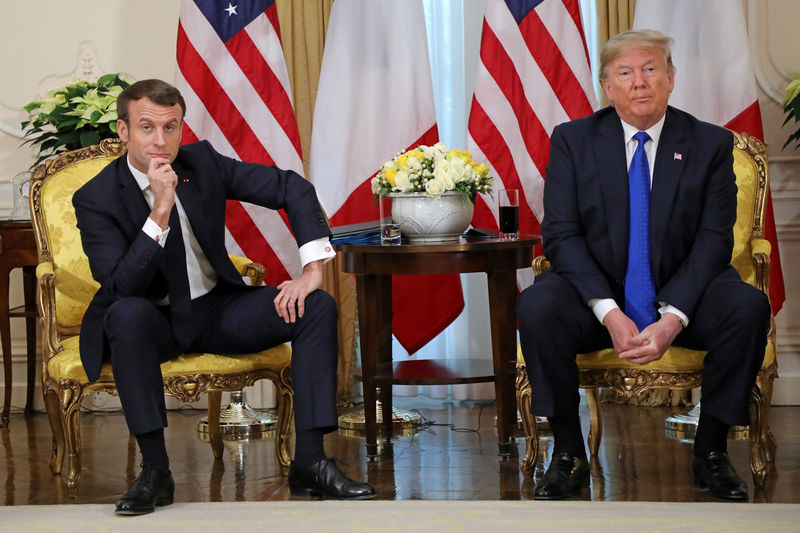By Luke Baker
LONDON (Reuters) - They have hosted each other for state visits and dined at the Eiffel Tower, but the once-budding bromance between U.S. President Donald Trump and France's Emmanuel Macron looks to have turned into a bad date as they traded blows ahead of a NATO summit.
Despite a 32-year age gap and very different personal styles, Macron and Trump have tended to put on a show of being best buddies, shaking hands with a tight grip and a big grin, bringing their wives along to dinners and exchanging gifts.
But after Macron's comments last month about the "brain death" of NATO and criticism of Turkish President Tayyip Erdogan over Syria, Trump appeared to take the gloves off on Tuesday, landing blow after blow against his one-time "bon ami".
"When you make a statement like that," he said of Macron's "brain dead" critique, "that is a very, very nasty statement to essentially 28, including them, 28 countries," the U.S. president told a news conference with the head of NATO.
"Nobody needs NATO more than France," he said, adding that France, where Macron has battled a year of protests against his economic reforms, was "not doing well economically".
As if to rub salt in the wound, the United States announced it would impose hefty tariffs on French luxury goods, wine and cheese, retaliation for a French plan to levy a digital tax on large tech companies, many of them American.
By the time Macron and Trump met face-to-face in London, the atmosphere was frosty, with onlookers ready for some sparring.
Trump wasted little time, saying only half-jokingly that Macron's response to one journalist's question about how France was dealing with returning Islamic State fighters was "one of the greatest non-answers I have ever heard".
Macron went on to contradict Trump's account of how Turkey had come to purchase a Russian air-defence system, and the two acknowledged they had problems to resolve over the tech tax and the tariffs threat.
Macron has in the past sought to ride out differences with Trump, emphasizing the need for constructive engagement even when the U.S. president pulled out of the Paris climate accord and withdrew from the nuclear agreement with Iran.
With the possibility of Trump winning reelection next year, and Macron in office until at least 2022, both have an interest in ensuring a squabble doesn't become a bitter break-up.
But if a gift Macron once gave Trump is symbolic of their relations, the omen is not good. During a state visit in April 2018, Macron, Trump and their wives planted an oak sapling from a French World War One battleground in the White House garden.

A few days later the sapling was dug up to be put in quarantine, where it died. In June this year, Macron played down any symbolism and said he would send the Trumps another tree. It is not clear if it was ever sent, or planted.